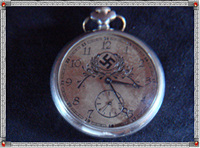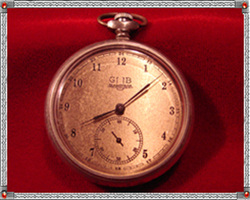
Although many people know better, the myth of Hitler's snub of Jesse Owens at the 1936 Olympics in Berlin is persistent. But that's not where the Olympic myths end. The alleged snub is not even the most important of several Berlin Olympics misconceptions that need correcting.
In his day, Ohio State track star James (“J.C.” Jesse) Cleveland Owens (1913-1980) was as famous and admired as Carl Lewis, Tiger Woods, or Michael Jordan are today. (1996 Olympic champ Carl Lewis has been called the “second Jesse Owens.”) But there are significant differences between then and now. Because of racial discrimination in his native land, Jesse Owens was not able to enjoy anything close to the huge financial benefits that African American athletes can expect today. When Owens came home from his success in Nazi Germany, he faced barriers that he would not face today. After the ticker-tape parades, he received no Hollywood offers, no endorsement contracts, and no ad deals. His face didn't appear on cereal boxes. Three years after his victories in Berlin, a failed business deal forced Owens to declare bankruptcy. He made a modest living from his own sports promotions, including racing against a thoroughbred horse. After moving to Chicago in 1949, he started a successful public relations firm. Owens was also a popular jazz disc jockey for many years in Chicago.
In his day, Ohio State track star James (“J.C.” Jesse) Cleveland Owens (1913-1980) was as famous and admired as Carl Lewis, Tiger Woods, or Michael Jordan are today. (1996 Olympic champ Carl Lewis has been called the “second Jesse Owens.”) But there are significant differences between then and now. Because of racial discrimination in his native land, Jesse Owens was not able to enjoy anything close to the huge financial benefits that African American athletes can expect today. When Owens came home from his success in Nazi Germany, he faced barriers that he would not face today. After the ticker-tape parades, he received no Hollywood offers, no endorsement contracts, and no ad deals. His face didn't appear on cereal boxes. Three years after his victories in Berlin, a failed business deal forced Owens to declare bankruptcy. He made a modest living from his own sports promotions, including racing against a thoroughbred horse. After moving to Chicago in 1949, he started a successful public relations firm. Owens was also a popular jazz disc jockey for many years in Chicago.

AUTHENTIC 1936 OLYMPIC WATCH! - Click image for more information.
Jesse Owens was wearing German track shoes when he won his gold medals in Berlin. So were all the members of the German team and most of the track and field athletes.The fact that there were American athletes competing in the 1936 Olympics at all is still considered by many to be a blotch on the history of the U.S. Olympic Committee. Germany's open discrimination against Jews and other “non-Aryans” was already public knowledge when many Americans opposed U.S. participation in the “Nazi Olympics.” Opponents to U.S. participation included the American ambassadors to Germany and Austria. But those who warned that Hitler and the Nazis would use the 1936 Olympic Games in Berlin for propaganda purposes lost the battle to have the U.S. boycott the Berlin Olympiade.
Which brings us to another Olympic myth. It is often stated that Jesse Owens' four gold medals humiliated Hitler by proving to the world that Nazi claims of Aryan superiority were a lie. But Hitler and the Nazis were far from unhappy with the Olympic results. Not only did Germany win far more medals than any other country at the 1936 Olympics, but the Nazis had pulled off the huge public relations coup that Olympic opponents had predicted, casting Germany and the Nazis, falsely, in a positive light. In the long run, Owens' victories turned out to be only a minor embarrassment for Nazi Germany.
But Jesse Owens' reception by the German public and the spectators in the Olympic stadium was warm. There were German cheers of “Yesseh Oh-vens” or just “Oh-vens” from the crowd. Owens was a true celebrity in Berlin, mobbed by autograph seekers to the point that he complained about all the attention. He later claimed that his reception in Berlin was greater than any other he had ever experienced, and he was quite popular even before the Olympics.
Which brings us to another Olympic myth. It is often stated that Jesse Owens' four gold medals humiliated Hitler by proving to the world that Nazi claims of Aryan superiority were a lie. But Hitler and the Nazis were far from unhappy with the Olympic results. Not only did Germany win far more medals than any other country at the 1936 Olympics, but the Nazis had pulled off the huge public relations coup that Olympic opponents had predicted, casting Germany and the Nazis, falsely, in a positive light. In the long run, Owens' victories turned out to be only a minor embarrassment for Nazi Germany.
But Jesse Owens' reception by the German public and the spectators in the Olympic stadium was warm. There were German cheers of “Yesseh Oh-vens” or just “Oh-vens” from the crowd. Owens was a true celebrity in Berlin, mobbed by autograph seekers to the point that he complained about all the attention. He later claimed that his reception in Berlin was greater than any other he had ever experienced, and he was quite popular even before the Olympics.

AUTHENTIC GLASCHUTTE 1936 OLYMPIC WATCH - Click for more information
The Snub Myth
Hitler did shun a black American athlete at the 1936 Games, but it wasn't Jesse Owens. On the first day of the Olympics, just before Cornelius Johnson, an African American althlete who won the first gold medal for the U.S. that day, was to receive his award, Hitler left the stadium early. (The Nazis later claimed it was a previously scheduled departure.) Prior to his departure, Hitler had received a number of winners, but Olympic officials informed the German leader that in the future he must receive all of the winners or none at all. After the first day, he opted to acknowledge none. Jesse Owens had his victories on the second day, when Hitler was no longer in attendance. Would Hitler have snubbed Owens if he had been in the stadium on day two? Perhaps. But since he wasn't there, he didn't.
Ironically, the real snub of Owens came from his own president. Even after ticker-tape parades for Owens in New York City and Cleveland, President Franklin D. Roosevelt never publicly acknowledged Owens' achievements (gold in the 100 meter, 200 meter, 400 meter relay, and long jump). Owens was never invited to the White House and never even received a letter of congratulations from the president. Almost two decades passed before another American president, Dwight D. Eisenhower, honored Owens by naming him “Ambassador of Sports” — in 1955.
Hitler did shun a black American athlete at the 1936 Games, but it wasn't Jesse Owens. On the first day of the Olympics, just before Cornelius Johnson, an African American althlete who won the first gold medal for the U.S. that day, was to receive his award, Hitler left the stadium early. (The Nazis later claimed it was a previously scheduled departure.) Prior to his departure, Hitler had received a number of winners, but Olympic officials informed the German leader that in the future he must receive all of the winners or none at all. After the first day, he opted to acknowledge none. Jesse Owens had his victories on the second day, when Hitler was no longer in attendance. Would Hitler have snubbed Owens if he had been in the stadium on day two? Perhaps. But since he wasn't there, he didn't.
Ironically, the real snub of Owens came from his own president. Even after ticker-tape parades for Owens in New York City and Cleveland, President Franklin D. Roosevelt never publicly acknowledged Owens' achievements (gold in the 100 meter, 200 meter, 400 meter relay, and long jump). Owens was never invited to the White House and never even received a letter of congratulations from the president. Almost two decades passed before another American president, Dwight D. Eisenhower, honored Owens by naming him “Ambassador of Sports” — in 1955.
